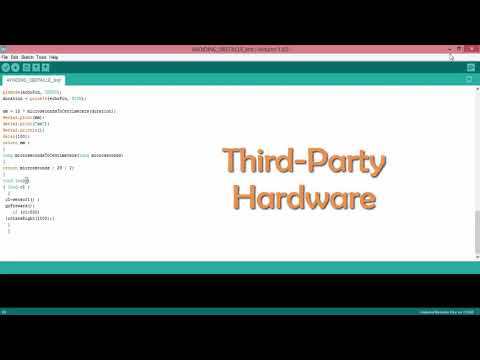How to Create an Obstacle Avoiding Arduino Robot
by mohamed hedi kasraoui in Circuits > Arduino
203 Views, 1 Favorites, 0 Comments
How to Create an Obstacle Avoiding Arduino Robot


Hi Everyone and welcome to this amazing quick project of how to create your first obstacle avoiding robot for absolute beginners using the Arduino Uno board.
What Is an Arduino

The Arduino Uno is an open-source microcontroller board based on the Microchip ATmega328P microcontroller and developed by Arduino.cc.The board is equipped with sets of digital and analog input/output (I/O) pins that may be interfaced with various expansion boards and other circuits.
What Does the Arduino Do

General pin functions;
- LED: There is a built-in LED driven by digital pin 13. When the pin is high value, the LED is on, when the pin is low, it is off.
- VIN: The input voltage to the Arduino/Genuino board when it is using an external power source
5V: This pin outputs a regulated 5V from the regulator on the board.
3V3: A 3.3 volt supply generated by the on-board regulator. The maximum current draw is 50 mA.
GND: Ground pins
IOREF: This pin on the Arduino/Genuino board provides the voltage reference with which the microcontroller operates.
Reset: Typically used to add a reset button to shields that block the one on the board.
What's on the Arduino Board

The board is equipped with sets of digital and analog input/output (I/O) pins that may be interfaced to various expansion boards (shields) and other circuits. The board has 14 digital I/O pins (six capable of PWM output), 6 analog I/O pins, and is programmable with the Arduino IDE (Integrated Development Environment), via a type B USB cable. It can be powered by the USB cable or by an external 9-volt battery, though it accepts voltages between 7 and 20 volts.
Components You Need to Create This Robot

To Make this Robot you need to buy the following components;
- Arduino Uno Board: https://shrsl.com/2cqms
- L298N: https://shrsl.com/2cqnc
- HC-SR04 : https://shrsl.com/2cqnc
- Breadboard : https://shrsl.com/2cqnc
- Wires : https://shrsl.com/2cqnc
- DC Motors + wheels: https://shrsl.com/2cqnc
- Chassis + battery : https://shrsl.com/2cqnc
Components You Need to Create This Robot P2

Arduino Uno Board: https://shrsl.com/2cqms
L298N: https://shrsl.com/2cqnc
HC-SR04: https://shrsl.com/2cqmy
Breadboard: https://shrsl.com/2cqmy
Wires: https://shrsl.com/2cqmy
DC Motors + wheels: https://shrsl.com/2cqmy
Chassis + battery : https://shrsl.com/2cqmy
Introduction About Fritzing

Fritzing is an open-source hardware initiative that makes electronics accessible as a creative material for anyone. We offer a software tool, a community website, and services in the spirit of Processing and Arduino, fostering a creative ecosystem that allows users to document their prototypes, share them with others, teach electronics in a classroom, and layout and manufacture professional PCBs.
The Wire Connections Between the Project Components


In this step, you need to follow the wiring connections between components very carefully in order for you to make this robot work correctly.
Introduction to IDE

The Arduino Integrated Development Environment - or Arduino Software (IDE) - contains a text editor for writing code, a message area, a text console, a toolbar with buttons for common functions, and a series of menus. It connects to the Arduino and Genuino hardware to upload programs and communicate with them
Writing Sketches

Writing Sketches;
Programs written using Arduino Software (IDE) are called sketches. These sketches are written in the text editor and are saved with the file extension .ino. The editor has features for cutting/pasting and for searching/replacing text. The message area gives feedback while saving and exporting and also displays errors. The console displays text output by the Arduino Software (IDE), including complete error messages and other information. The bottom righthand corner of the window displays the configured board and serial port. The toolbar buttons allow you to verify and upload programs, create, open, and save sketches, and open the serial monitor.
The File Menu

The Edit Menu

The Sketch Menu

The Tools Menu

Serial Monitor

The Libraries

Arduino Code Project

Download the pdf file which contains the Arduino code then transfer code it to the Arduino board
Downloads
How to Upload the Code From the IDE to the Arduino Board
